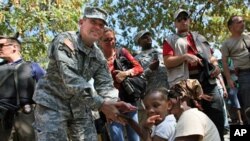The commander of U.S. military relief efforts in Haiti said Wednesday that the operation is becoming more civilian and more Haitian, but that there is still an important role for his troops in the earthquake-ravaged country.
Speaking via satellite from Port-au-Prince, Army Lieutenant General Ken Keen said the number of U.S. troops in Haiti and on ships nearby is down from a peak of 20,000 to 13,000 today -- about half of them on shore.
The general said he has been able to release thousands of troops because the Haitian government and foreign civilian aid organizations are now able to do more.
"As we see this transition occurring, we see our civilian partners increase their capabilities -- both the government here in Haiti as well as the non-government organizations -- we see the need for our military assistance dwindling," said Keen. "However, at the present time, there is still great need across the board. And we still remain decisively engaged providing critical assistance," he said.
Keen also said the need for medical services is less than had been expected. He noted that U.S. troops continue to help with food distribution, and provide engineering and logistical support to Haitian and international efforts. He reported that priorities are shifting to providing shelter for Haitians who were made homeless by last month's earthquake, and removing the rubble that blocks reconstruction.
The general also commented on a story in Wednesday's Washington Post newspaper that said some of the skills U.S. troops learned during the wars in Iraq and Afghanistan have come in handy in the Haiti relief operation.
"The experiences that they have gained in other places in the world and the counterinsurgency doctrine in terms of how you interact with the local population, how you work with civic leaders as well as religious leaders, and understanding the cultural dynamics on the ground are critical in any mission, and certainly in the humanitarian assistance missions we see," he said.
General Keen said the price tag for U.S. government post-earthquake assistance to Haiti is approaching $250 million. He noted that Washington continues to provide whatever assets he needs to carryout relief efforts.
US Haiti Relief Effort in Transition to Civilian Phase




